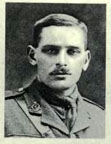 |
Remembrance
- The Yorkshire Regiment, First World War Captain John Ernscleugh BRYDON Close window to return to main page |

|
The thumbnail photo, above, is taken from the Edinburgh University Roll of of the Fallen.
Captain John Earnscleugh BRYDON.
Royal Army Medical Corps, attached to 4th Battalion Yorkshire Regiment. Son
of Mrs. Helen C. Brydon, of 5, Cobden Crescent, Edinburgh. Killed
on 27 June 1917. Aged 33.
Buried ST. MARTIN CALVAIRE BRITISH CEMETERY, ST. MARTIN-SUR-COJEUL.
A
photograph of Captain Brydon is contained in the University's Roll of
the Fallen. From this document, a brief biography shows that;-
He was born in Darlington and educated at Richmond School. He was a student
at the University from 1903 - 1908, being awarded an M B and Ch.B in 1908.
He was comissioned Captain in January 1914, and was attached to the Northumbrian
Division, Ammunition Column. He was gassed on 27 June 1917.
However, a much fuller biography of Captain Brydon has been
provided in the website "Returned
from the Front".
An obituary in the local paper read :-
“DARLINGTON DOCTORS DEATH
VICTIM OF GERMAN GAS ATTACK
With feelings of deep regret many people in Darlington have learnt of the death whilst on active service of Captain John Earnscleugh Brydon, R.A.M.C son of Mr John Brydon of Milbank, head of Messrs Kent and Brydon, seed merchants and nurserymen.
He died in hospital in France on June 27th 1917 from the effects of gas. His elder brother James Dempster Brydon has also been wounded.
Capt. Brydon, who was the fourth son of the family was 31 years of age was born at Milbank and was well known and popular amongst a wide circle in his native town. He was educated at Richmond Grammar school and at Edinburgh University where he took his degree in medicine and was for some time house surgeon at the Darlington Hospital and practised for some two years at Corbridge on Tyne where he took a keen interest in athletics, as he had done for some time. When war broke out he was in practice in Chagford in Devonshire. Already a Territorial, he volunteered for active service by virtue of his profession and was attached to the R.A.M.C. going to the front in April 1915. He was badly wounded in December of that year as a result of which he lost completely the sight of one eye. Despite this disability he was eager to return to his duties at the front, but several medical boards rejected him. Such was his undiminished spirit of patriotism that he appealed direct to the war office and was given permission to return to France. Posts outside the danger zone were offered to him. But his ardent desire was to be in the fore front of battle and he was eventually attached to the 4th Yorkshires, with whom he was serving when he came into contact with the fatal fumes that led to his death
In a letter to Mr Brydon, senior., Lieut.-Col. Deakin, commanding officer of Captain Brydon’s battalion, says,:- “ I am writing on behalf of all ranks of the battalion to express to you our deepest sympathy in the death of Capt. Brydon. He died from the effects of gas. We were with him most of the time, and I can honestly say he suffered none of those terrible sufferings of the early chlorine gas. He just got weaker and weaker till his heart gave out, and as far as I can tell he suffered no pain. I don’t think there is an officer or man in the battalion who has not felt his death. He was a wonderful regimental doctor Always cheery, always working for the men’s welfare. We were all devoted to him. I feel personally that I have lost a dear friend, and I shall be grateful all my life for having known him. There is nothing I can say to make this easier for you, but I thinkif you could have heard all the men said it would have been a little help to you in this terrible trouble. What I feel is so sad about is that it should have happened to a man who so gallantly preferred to soldier with an infantry battalion to a safe job farther back.”
A hand written post script at the foot of this obituary reads as follows:- A German shell burst one of our gas cylinders filling the dugout where he was dressing wounded soldiers. He apparently gave his gas mask to a patient and became overcome by the gas.
--------------> Return to Top of Page